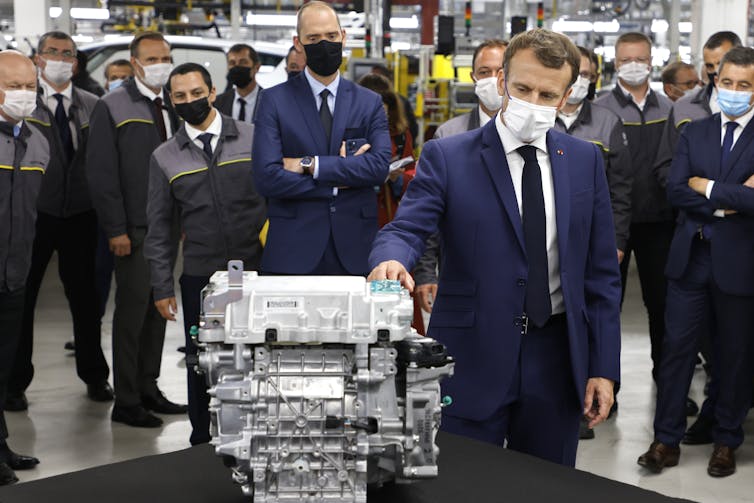Britishvolt, the would-be electrical car (EV) battery maker that lately went into management, at all times confronted an uphill fight. The beginning-up had no observe report growing generation and not showed how it might carry the £3.8 billion had to get started mass generating batteries, which reduces the typical price consistent with battery.
You’ll be able to concentrate to extra articles from The Dialog, narrated by way of Noa, right here.
The proposed facility close to Blyth, a coastal the town in north-east England, was once slated to give a contribution round 1 / 4 of what the United Kingdom car business wishes, or sufficient for 330,000 battery packs a yr. However with out a primary auto corporations as consumers, its industry style at all times regarded inclined.
This was once in spite of willing promotion from Boris Johnson when he was once high minister and a pledge of £100 million in public investment if positive stipulations at the manufacturing unit’s building had been met. They weren’t, and the federal government saved the money.
There stays hope that new possession may rescue the industry and that batteries for EVs may nonetheless be assembled on the web page. For now, regardless that, Britishvolt’s woes carry wider questions on the way forward for the United Kingdom car business because it transitions to creating EVs, and whether or not the federal government is doing sufficient to enhance it.

Owen Humphreys/PA Photographs/Alamy Inventory Picture
For the United Kingdom to change into a pacesetter in EV production, it wishes massive factories (known as gigafactories) making EV batteries and temporarily, as call for for EVs is commencing forward of a 2030 ban on new petrol and diesel automobiles, and the requirement for all new automobiles to be absolutely 0 emission by way of 2035. That is in particular pressing given the character of the business and cooperation settlement (TCA) between the United Kingdom and the EU.
The TCA calls for that batteries in EVs need to be assembled in the United Kingdom or the EU by way of the top of 2026 for cars traded between the 2 to keep away from price lists. The UK is lagging smartly in the back of EU international locations in attracting funding in battery-making, and Britshvolt’s cave in throws this into sharp aid.
With out a primary effort to construct a home provide chain that comes with battery production, UK automobile meeting traces will increasingly more be left generating out of date interior combustion engine automobiles and dependent upon imported battery parts from the EU to satisfy regulations of foundation necessities. That isn’t going to make a lot industry sense.
Practice the cash
Lately, a large number of funding in battery gigafactories has skirted the United Kingdom, partially as a result of uncertainty brought about by way of Brexit. Tesla boss Elon Musk mentioned as a lot in overdue 2019 when justifying his company’s resolution to construct its first primary Ecu gigafactory in Germany.
Together with Arrival’s resolution to shift electrical van manufacturing to the USA and Mini pulling the plug on EV manufacturing in Oxford, for now no less than, executive hopes for the United Kingdom auto business as an EV powerhouse appear caught in impartial, if now not opposite. The only piece of excellent information to this point is that battery maker Envision has dedicated to a brand new gigfactory in Sunderland that can come onstream in 2025 – the one showed funding in the United Kingdom.
In a just right yr, the United Kingdom makes between 1.3 and 1.5 million automobiles. Because the business seeks to offer UK and EU markets during which petrol or diesel car gross sales are being phased out from 2030, keeping up a equivalent degree of manufacturing would require a large number of batteries.
The United Kingdom has been sluggish to get executive enhance coated up for such funding. To this point, simplest £800 million has been earmarked for the mass manufacturing of EV batteries. Call for for EV batteries in the United Kingdom may achieve as prime as 130 gigawatt-hours (GWh) a yr by way of 2040, similar to the output of 8 gigafactories with a capability of 15GWh each and every. Assembly this call for will require an funding of between £5 billion and £18 billion by way of 2040 in line with one estimate.
In the meantime, there are at least 35 gigafactories up and working or underneath building within the EU, together with the ones by way of NorthVolt (in Sweden), Saft/Stellantis (in France and Germany), Samsung SDI (in Hungary), LG Chem (in Poland), and Tesla (in Germany).
The Ecu Fee and seven member states have allotted round €6 billion (£5 billion) to lend a hand construct as much as 20 gigafactories and goal at having one-third of the sector’s EV batteries being made within the EU by way of 2030. That is anticipated to serve an estimated €250 billion-a-year marketplace by way of that point. EU member states are merely doing extra to draw funding in battery manufacturing than the United Kingdom, with heavy monetary enhance and particular financial zones to woo producers.

EPA-EFE/Ludovic Marin
If the United Kingdom auto business is to compete, it is going to wish to produce its personal batteries at scale. Home battery manufacturing will scale back provide chain prices and simplicity logistical difficulties. It must additionally lend a hand UK-based carmakers and battery producers paintings extra carefully in spaces comparable to battery mobile generation and technician coaching – crucial to the business’s competitiveness.
For this to be imaginable, the federal government should assume extra creatively about how one can goal monetary enhance for automobile and battery makers. And, in flip, the car business wishes a extra energetic commercial technique and nearer partnerships with executive, particularly when it comes to reorientating abilities and the availability chain in opposition to EVs.
This isn’t about choosing winners – call for for EVs produced in the United Kingdom and across the world is forecast to be there. And expanding UK gross sales of EVs point out a increasing home marketplace for batteries. McKinsey specialists forecast that by way of 2040, battery call for for Ecu EVs will achieve 1,200GWh consistent with yr, or the output of 80 gigafactories with a median capability of 15GWh.
The United Kingdom dangers lacking out on new funding in a increasing business. If the United Kingdom needs to handle its massive car meeting capability because it transitions to creating EVs, then it is going to want home made batteries and on a big scale. Just a made over commercial technique can assist in making this occur.

Don’t have time to examine local weather exchange up to you’d like?
Get a weekly roundup on your inbox as a substitute. Each Wednesday, The Dialog’s surroundings editor writes Consider, a brief e mail that is going slightly deeper into only one local weather factor. Sign up for the ten,000+ readers who’ve subscribed to this point.
https://theconversation.com/britishvolt-more-evidence-uk-is-falling-far-behind-in-race-to-capture-growing-ev-market-198104